Cycling Through Puglia: A Senior's Guide to Slow Travel in Italy
Savoring Local Culture, Cuisine and Wineries
Article and photos by Cherie Thiessen
|
|
|
Getting off the bike to visit the Castle at Acaya in Puglia.
|
Why Puglia?
Italy is a small country crammed with tourist appeal. Visiting popular places like Rome, Florence, Venice, and Naples can feel like you're cheek to jowl with other tourists in an endless progression. Being "down at the heel" is less expensive, less crowded, and far less hectic, where locals still take time with their food preparations, foods, and wines are proudly local, traditions are unchanged, visitors are welcomed, and attractions are endless. Need more convincing? National Geographic Traveler voted the region of Puglia as one of the best trips and values for 2021.
Why Cycle in Puglia? The Beauty of Slow, Sustainable Travel
|
|
|
Cycling in Puglia slowly through the quiet roads winding past roadside flowers and olive groves is an environmentally sustainable, personally healthy, and relaxing way to see the region.
|
Carlo Cascione says it all. "We promote a lifestyle focused on the reduction of consumption and energy. We want to put a stop to the excessive use of cars, which damage the environment and even people's health." Salento Bici Tours principal, Cascione, is passionate about his mission. We're finishing breakfast in the verdant courtyard of our first night's accommodation, B & B Palazzo dei Dondoli in Lecce, the Baroque capital of the region of Salento, a walled town of Roman theaters, cobble-stoned streets, ornate churches, and old city walls. Salento is the heel of Italy's boot, the southeastern part of Puglia. We've booked a week's self-guided bicycle tour through Mac's Adventures. Salento Bici Tours, formed in 2011, is their regional partner (see end of article for links).
Cascione could have just pulled up with the bikes on Day 1 of our tour, helped us load our gear into the saddlebags provided, explained the basics, and led us through town, ensuring we knew how the GPS worked and how crazy the traffic was. But it's not just a business for him or his partners. It's a mission: "We want to develop cycle tourism and stimulate knowledge of the landscape, the culture, the people, and the history by having people move slowly through the land. We believe that the bicycle is one of the keys to opening the door to a wiser world and offering tourists the chance to cross the country at a pace set by their own strength and interests."
Well, when you're a senior, as we are, slowly crossing the country feels just right. The company also offers themed guided tours daily to week, but we preferred the more independent option. We followed a designated route with all accommodations booked, bicycles supplied, and luggage transported without needing to keep up with a group.
Salento Bici Tours spreads a sustainable, slow travel message by collaborating with local agencies and schools. "We chose to work in partnership with them mainly because of their intimate local knowledge," said the Product Manager at Mac's Adventure. "They are great to work with, and I was really impressed with their eco-friendly philosophy and the fact that 20% of their profits go to the non-profit side of their organization, which is developing cycling tourism in the Salento region."
Cascione winds up as we finish up our cappuccini and succulent breakfast pastries. He has filled us in on the history of the area we have chosen to cycle, which is rich in antiquities, ancient villages, castles, and sea vistas. The written itinerary he hands us merely adds to the caffeine to pump us full of adrenaline and energy: the medieval village of Acaya with its castle and old walls, a wildlife sanctuary with a lake, the 3000-year-old Messapian ruins of a Bronze Age village by the sea, the most eastern part of Italy, Otranto, so close to Albania you can see its mountains on a clear day. And that's all just Day 1. We can't wait to get rolling. Cascione leads us out and meets our spiffy bikes: Bottecchia Tempo Libero 21-speed hybrid beauties. Eagerly, we mount and follow him through Lecce. Then he waves goodbye, and we can follow our GPS and hearts. We remember that there is another good reason to cycle: it's good for you, mentally and physically.
The Cycling Route: Exploring Natural, Cultural, Culinary and Historic Landscapes
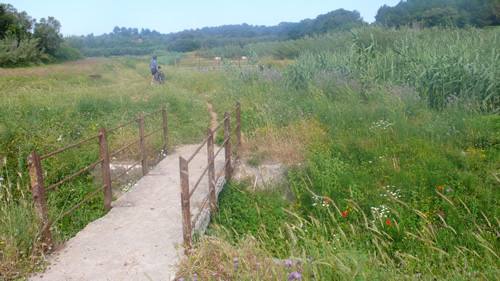
|
|
On the trail on Day 2 of our cycling route.
|
On the trail on Day 2 of our cycling route.
Our first day spreads like a delectable smorgasbord on a cloudless late May. Before we know it, we've left Lecce behind and find ourselves on a quiet country lane, fringed on both sides by a riot of Prickly Pear, swathes of poppies, yellow daisies, purple thistle, and blue "bachelor's buttons," while the scent of wild fennel flavors the air. We're advancing on Acaya, the only example of an intact fortified medieval town in southern Italy. It's late morning, but the town's still asleep. We sit, entranced, alone on a bench within the old city walls, ogling the ancient fortress and feeling alone in this magical place encased in time. My partner, David, breaks the mood. "We need to go." It's true, we do. Today, it's a 56-km day. Our total week's trip will be 263-km., not too harsh at all, but there is so much to see, local foods and wines to sample, pictures to take, people to chat with, and the Adriatic to swim in, and we can't miss a thing!
After winding through a verdant bird reserve, we catch the sight and tang of the Adriatic, and we soon enter the seaside town of San Foca. Teased by whimsical ocean breezes, we sit outside and order pizza rustica, polpette di carne (meatballs), and fizo di zucca in pastella (zucchini flowers in a tempura batter, a popular local dish.) One of the local wines washes down, Primitiva, under the incredulous eyes of our server. It's only noon; why are we eating lunch already?
The afternoon unrolls, the sapphire sea enthralls, and the prehistoric ruins of a Messapian village moldering on the seafront bring us to a stop. Mac's Adventure offered several different tours of the area. Still, we were snagged by the variety in this tour and by the fact that it took us through what has been called the most extensive megalithic garden in Europe, adorned with ruins like this, with ancient gravesites, dolmens (a single chamber megalithic tomb), and menhirs (standing stones). Finally, sunburnt, dazed, and too ecstatic to be tired, we enter the magical seaside town of Otranto, its iconic castle on the hill, its sliver-sized cobbled streets, and its lazy, picturesque harbor and parks. Happily, we are spending two nights here, as tomorrow we explore the area more thoroughly, sample some of the local foods and wines as part of the tour, and see more of this "megalithic garden."
On Day 3, it's all about the ocean. We encounter our first actual hills but are so distracted by the ancient lighthouses, the views over Otranto Strait, and the siren call of the seashore that we hardly notice we're pumping harder. We stop for an iced coffee with almond milk (Latte di Mandorla) and head off again for more Adriatic in our faces, a breeze at our backs, and a cycle route now kissing the shore.
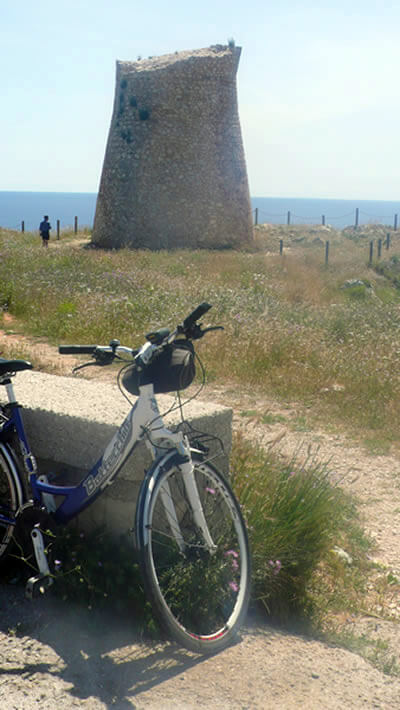
|
|
Getting off the bike to visit a coastal watchtower, one of many built for defense against the Ottoman Empire and pirates.
|
From Leuca to Ugento, from Ugento to the walled city of Gallipoli, and from Gallipoli back to Lecce via Copertino, our route was perfectly planned and delivered daily surprises and pleasures, even on our one day of rain. When you know, you'll snug up at the end of a day in a local masseria (a fortified farmhouse) or a cozy B & B, and when there is always a café or bar to stop and get dry at. At the same time, you try out a different coffee or wine; somehow, getting wet doesn't seem to be much of a bother.
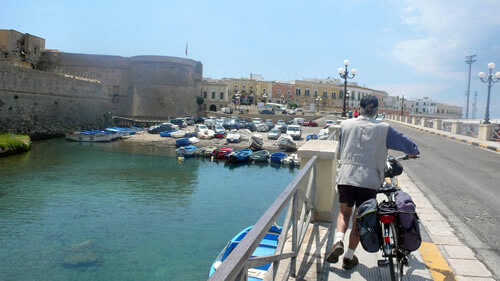
|
|
Entering the island of Gallipoli over the bridge of the walled city, David relaxes and walks with his bike.
|
We could never have found these paths, lanes, and sleepy back roads winding through olive groves, old burial sites, and along the coastline — a route that sings, filled with birdsong and the tang of wildflowers. We would never have wound past megalithic ruins, discovered the best place to try local foods, or found the perfect overnight accommodations in perfect settings at the best moment. Mac's Adventures and Salento Bici Tours did it for us.
Cycling Trip Highlights in Puglia
Of course, there are too many to count, but here are some:
-
On Day 1, I sat in the ruins of Roca Vecchia, a Bronze Age village built atop karst caves, overlooking the sea with no one else in sight. A site like this would have been overrun with tourists anywhere else in the world.
-
On Day 2, I cycled along a tiny path from Otranto. I slipped through a fence after a few kilometers to view the Saint Angelo Byzantine crypt. Excavated in the rock by the Basilian monks escaping from the east during the iconoclastic persecution, the crypt still shows some of the bright frescos — a slice of history in the most unlikely place and for us alone.
-
On a hot Day 3 in Specchia Gallone, we stopped at Caroppo Bakery, a vast, cool set of rooms where not only was bread made from wheat grown and ground on the premises and cooked in stone ovens, but vegetables, fruits, and meat were also provided from the property. Before the genial son toured the property with us, we sipped a delicious local rosé wine. We sampled over a dozen local dishes, like pitta di patate di zucchini lesse, and arancini di riso.
-
The "Zen" of cycling along country lanes and footpaths through olive groves and hardly ever encountering anyone on much of the route, led on by our indefatigable GPS and the brilliance of the scarlet poppies ever ahead lining the fields.
-
The delight of discovering a perfect beach on Day 6 at Santa Maria Al Bagno.
-
Our extravagent room at B & B Palazzo Flora Gallipoli, where we felt like we had a slice of our own Sistine Chapel, a massive room with high ceilings and two balconies overlooking a narrow street. Palazzo Flora was originally a 19th-century residence, restored to its original grandeur, and they must have given us their "star" room. A modern Michelangelo had totally painted the lofty, expansive ceiling.
-
The friendliness of the people we met never failed to amaze us. How much can be communicated with a smattering of Italian mingling with a poco (little bit) of English?
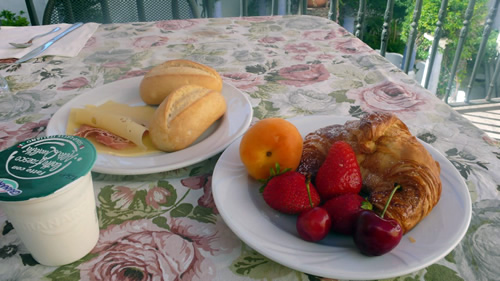
|
|
Highlight: Breakfast at the Palazzo Flora B & B in Gallipoli was just the beginning of many excellent meals in Puglia.
|
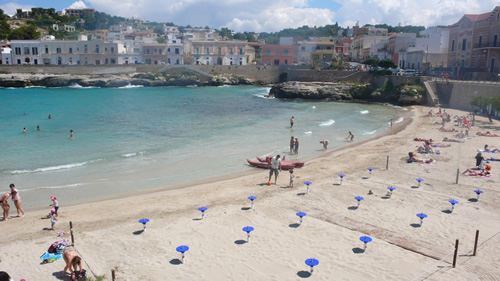
|
|
Highlight: Discovering a perfect beach on Day 6 at Santa Maria Al Bagno.
|
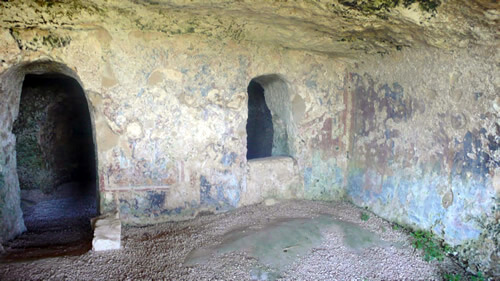
|
|
Highlight: A view inside the Byzantine crypt of St. Angelo.
|
Must-Sees at the UNESCO World Heritage Sites
While our tour did not include two important cities in Puglia, they should be on everyone's list based in Lecce.
-
The World Heritage Site of Alberobello can easily be visited by an inexpensive train ride from Lecce in a day. The town is known for its conical structures called Trulli — traditional limestone white circular dwellings that are remarkable examples of mortarless construction, a prehistoric building technique still in use in the region. They feature pyramidal, domed, or conical roofs built of corbelled limestone slabs. Their unique features, the fact that the buildings are still occupied and the ancient building technique still used, make the site unique.
-
Matera and the Sassi district. Another UNESCO World Heritage Site, Matera, is a different world. The district of Sassi, a ravine with ancient cave dwellings piled high one upon the other, all carved into the rock face, illustrates yet another way that earlier civilizations forged homes in one of the country's poorest regions. Walk to the overlook near Piazza Vittorio Veneto and then go down the stairs to explore the warren of cave homes and the winding alleys.
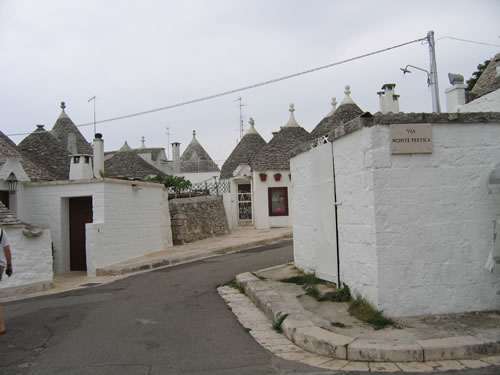
|
|
Must-see: The cone-shaped roofs of houses in Alberobello.
|
|
|
Must-see: The ancient and mysterious town of Matera, houses, and caves dug into the surrounding rock hills.
|
A Cyclist’s Memory of Puglia: Slow Travel and Authentic Encounters
We totally agree with Cascione that the best way to see a place is to go slow and put yourself in the middle of it, with time to stop and chat, discover a museum hidden down a twisting alley, taste sea urchin with a glass of Primitivo at the locals' favorite bar, try operating a traditional olive press, or watch women weaving in ancient, conventional ways. What better way to do it than by bike?
When to Go
Mid-May to mid-June and September through mid-October is good, before or after the heat builds.
Speak Italian?
Some Italian will be useful, as this area is not full of tourists — part of its charm. We studied Italian for 6 weeks online and were amazed at how much it helped and enabled us to connect with the locals. Guides at the historic sites often speak only Italian. Your contacts at Salento Bici Tours talk in English, and someone at most of your accommodations will know some English. You can manage without, but it's more fun to try. (Salento Bici tours even offer a week's guided tour of cycling and learning Italian.)
|
For More Information
Luxury Rooms and Apartments at Palazzo dei Dondoli is a lovely — and relatively affordable, despite the name — accommodation located in Lecce, Puglia.
Mac’s Adventures is an agency offering self-guided walking and cycling holidays in Europe and worldwide. They connected us to our cycling tour in Puglia.
Salento Bici Tours is a local company offering a variety of guided and self-guided cycling tours originating in Salento, Puglia. Options include Italian language learning, food, and wine.
|
Cherie Thiessen writes travel stories from Canada's West Coast Gulf Islands. She is a member of the Travel Media Assoc. of Canada and the B.C. Travel Writers' Assoc. She taught travel writing at the University of Victoria for many years. She has also lived and taught English abroad in China, Japan, and South Africa.
|
